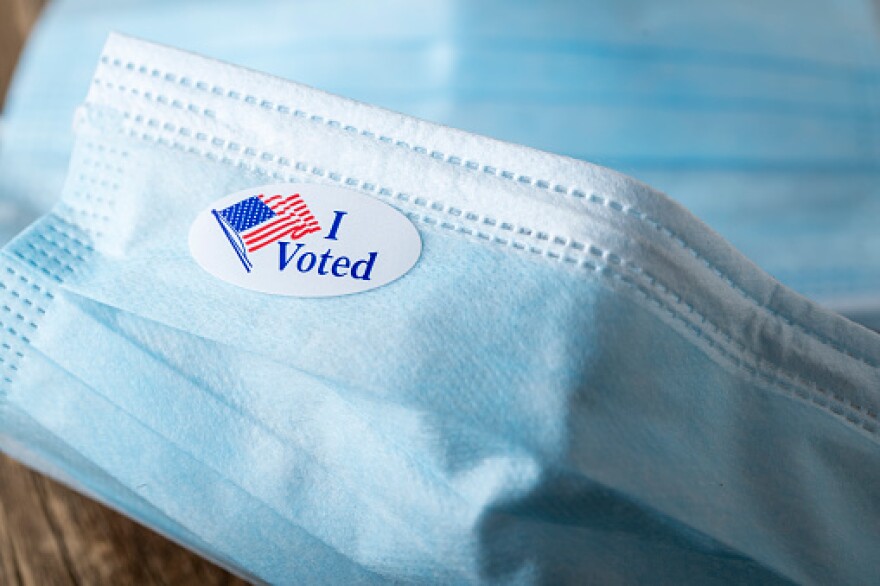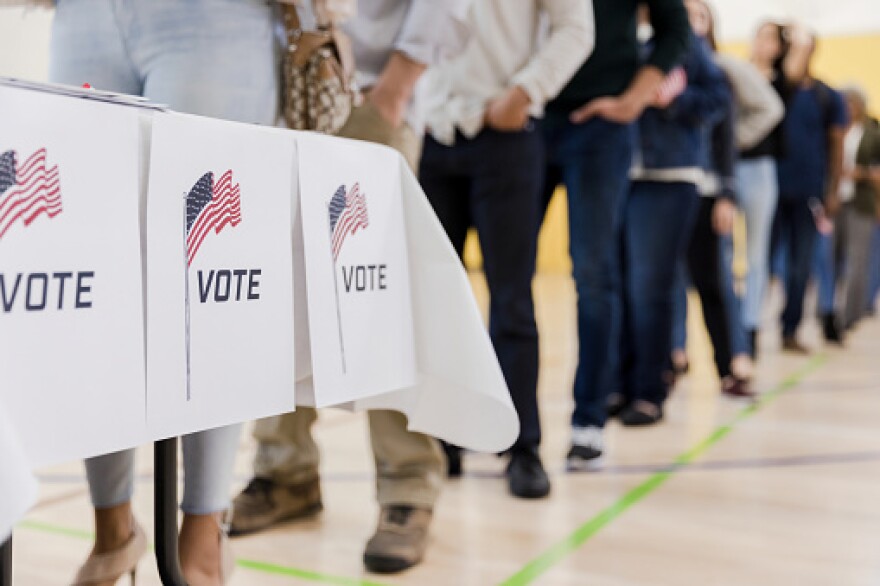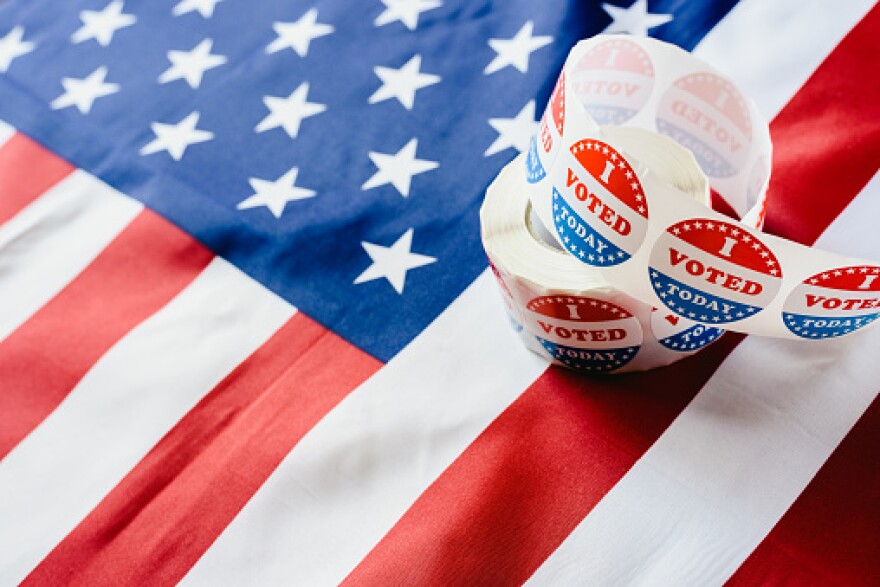Coronavirus numbers continue to rise in Alabama. The pandemic has led to changes and new safety measures across the state as Alabamians work to keep exposure low. Now, two separate lawsuits are seeking to ease the state’s rules on absentee and in-person voting during the deadly pandemic. Some precautions are already being taken, but advocacy groups say the restrictions force voters to choose between their health and their democratic right to vote.
Seth Levi is a chief strategy officer for the Southern Poverty Law Center.
“Alabama is one of the last remaining states where an excuse is required to vote absentee," he said. "There is no early voting. And the Secretary of State there has fought every imaginable voting reform that would bring the state into the 20th century.”

The SPLC and the League of Women Voters have filed separate lawsuits challenging the current voting process in Alabama ahead of several elections in 2020.
Caren Short is a senior staff attorney for the law center. She said it’s past time to challenge the state’s absentee and in-person voting requirements.
“Voting should be a simple process. It’s a fundamental right, and the state should be making it easier, not harder, to vote," she said.
Right now, to vote absentee in Alabama, voters must hand in photocopies of their photo ID with the absentee ballot and application, then sign the ballot in front of a notary or two witnesses in order for the vote to count. Short said the requirements put restrictions on the voting process.

“We feel there’s really no need for these additional requirements. There are already provisions within Alabama to safeguard the absentee ballot process,” she said. “A voter has to include some personal information. They have to include the last four digits of their SSN or their Alabama driver’s license.”
The SPLC and the League of Women Voters aren’t the only organizations raising issue with the current voting requirements. DeJuana Thompson is a co-founder of Woke Vote. The organization mobilizes people of color in the South to vote by organizing their political and social power. One issue Woke Vote fights against is voter suppression in Alabama. That’s something Thompson said is front and center on the minds of Black voters.
“Especially in the middle of [the] coronavirus, the state not taking steps to provide more opportunities for people to vote but making it more stringent speaks to whether or not they really concerned with voters being able to have full enfranchisement,” she said.
Voting advocates celebrated a win last week when a federal judge ruled Alabama cannot prohibit local officials from offering curbside voting during the COVID-19 pandemic. The judge also loosened restrictions on absentee ballots in Mobile, Jefferson and Lee counties because of the health risk to voters.
Advocates say although this is progress, it’s still not enough because the ruling only applies to the July 14 runoff election. Woke Vote and the SPLC are calling on local and state leaders to make safer, concrete rules for all Alabama counties in every election during 2020.

“When it comes to absentee voting, we’re asking that curb-side voting be allowed for the 2020 elections,” Short said. “We’re asking no absentee ballots be thrown out because they don’t comply with the two witness or notarization requirement during the 2020 elections. And we’re asking that no absentee ballot or application be rejected because they do not comply with the photo ID requirement.”
DeJuana Thompson agrees.
“Some sort of standard needs to be upheld in how we make the decisions in the ways in which voters will have the opportunity to vote in November and the runoff elections that are coming up,” she said.
As the lawsuits make their way through the courts, Alabama Secretary of State John Merrill said he’s already taken steps to make it simpler and safer to cast a ballot.
“One of the things we’ve done to make it easier to vote absentee is evoke the powers that are given to the Secretary of State than enables me to direct the voter to mark a particular box since Alabama is an absentee excuse state,” he said.

Under Alabama’s current law, an excuse is required for someone to vote absentee. Merrill is suggesting Alabamians check the box on their application if they are worried about risk of the coronavirus. That box reads “I have a physical illness or infirmity which prevents my attendance at the polls.” This suggestion is only for voting during the July 14t runoff.
Some voter advocates like the League of Women Voter president Barbara Codell take issue with the action.
“So if we go down that path, somebody like me that’s not sick, has a little trepidation about checking that box because I am not sick, but I am afraid of being sick,” she said.
Codell, the League and the SPLC are fighting for “no excuse” absentee voting along with waiving current requirements to cast an absentee ballot. That’s something Merrill said isn’t possible.
“Some people have indicated they want us to do more, like removing the provisions all together, or removing the signature requirements all together. Or removing the validation for witnesses or a notary," he said. "But Title 17-11-7 does not give me the ability to remove those requirements because they are codified in the Alabama Code. That would require legislative action.”
The Alabama Legislature isn’t scheduled to meet until the spring of 2021, unless called into a special session. As far as current law goes, Merrill has the backing of the Department of Justice.
Back in May, the DOJ defended Alabama’s requirement does not violate the Voting Rights Act. That includes either having voters get either an affidavit from a notary public or two adult witness signatures.

Merrill said the Yellowhammer State is taking steps to keep voters and poll workers safe from the Coronavirus.
“We are using the resources from the CARES Act to cover the cost of preparing polling sites for visits from our voters,” he said. “Each polling official will be given a mask, gloves, sanitation wipes and hand sanitizer will be provided for voters who come out to the polling sites on those days.”
But some say those safety precautions don’t go far enough to protect voters and ultimately makes Alabamians choose between their health and the democratic right to cast a ballot.
“I believe by not creating more opportunities or alternative ways for people to vote, this state, and others like it, who are asking for all voters to put their lives on the lines in the middle of pandemics for their Constitutional rights… that is wrong," Thompson said.
So far, Merrill has only allowed relaxed absentee voting for the July 14 runoff election. He has not said if the same rules will apply to mayoral and council elections happening in the majority of Alabama cities on Aug. 25 or the general election set for Nov. 3.




